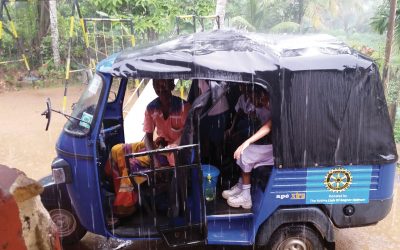How much does an international project cost?
For The City of St. Asaph Rotarians, it was lots of friendship, good connections, plenty of fellowship and great effort – with only a little cash.
The North Wales club’s impressive project to help the School for the Blind of Budapest came about through a series of friends.
John Harris, who is not a Rotarian but regularly supports St. Asaph, spotted the possibility. John works worldwide in education, specifically supporting those who teach children with disabilities – and one of the centres which John works with is the Budapest school.
The School for the Blind of Budapest is one of the first specialist schools for the blind in the world.
The title of School for the Blind is something of a misnomer. Initially founded in 1826, but occupying its current buildings since the 1880s, the school now accepts students up to the age of 26-years-old with a range of disabilities, though their main sensory disability is blindness.
Another centre John has contact with is the Brondyffryn School in Denbighshire, which provided a sense of serendipity for the Rotary project.
The school in Denbighshire announced that it was going to relocate, making available some of its equipment. John moved in quickly, aware that the Hungarian school wanted the equipment, so he contacted Rotary friends to ask if they could help transfer the equipment.
What was being given away was an entire sensory room, including a number of specialist features and a lot of electrical sensory stimulators.
Rotarians arrived with a small van and several cars to retrieve the dismantled room, before hiring a van to transport the equipment, including a two-metre long acrylic tube, padded walls and all the electrics, to a warehouse in Chester.
The School for the Blind of Budapest is one of the first specialist schools for the blind in the world.”
While all this was going on, the school’s principal in Budapest managed to persuade DHL to transport the three pallets of equipment for free on the 1,300-mile journey from Chester to Budapest.
The room was successfully transported to the Hungarian capital where it was stored at the school until space was cleared for it to be re-erected.
With no instructions for reassembling the electrical equipment, this took six months to complete before the room was finished to the delight of the students who now have a safe sensory space in which to relax and learn.
Oh and the money? St. Asaph Rotarians spent about £60 from club funds to hire the van to transfer the items from St. Asaph to Chester. All the rest was friendship and goodwill.
For more information visit: sensage.eu/members/hungary/budapest


























































